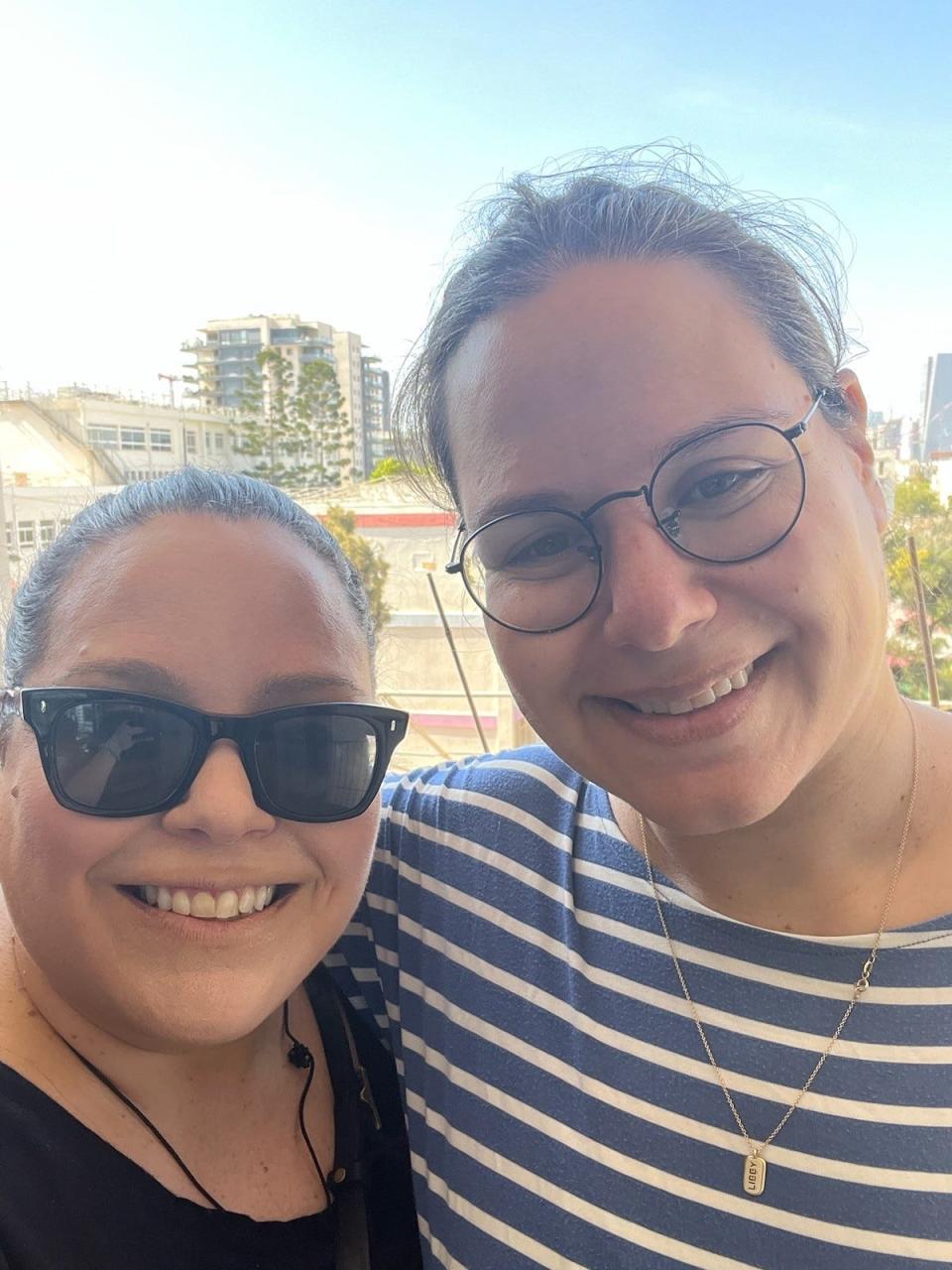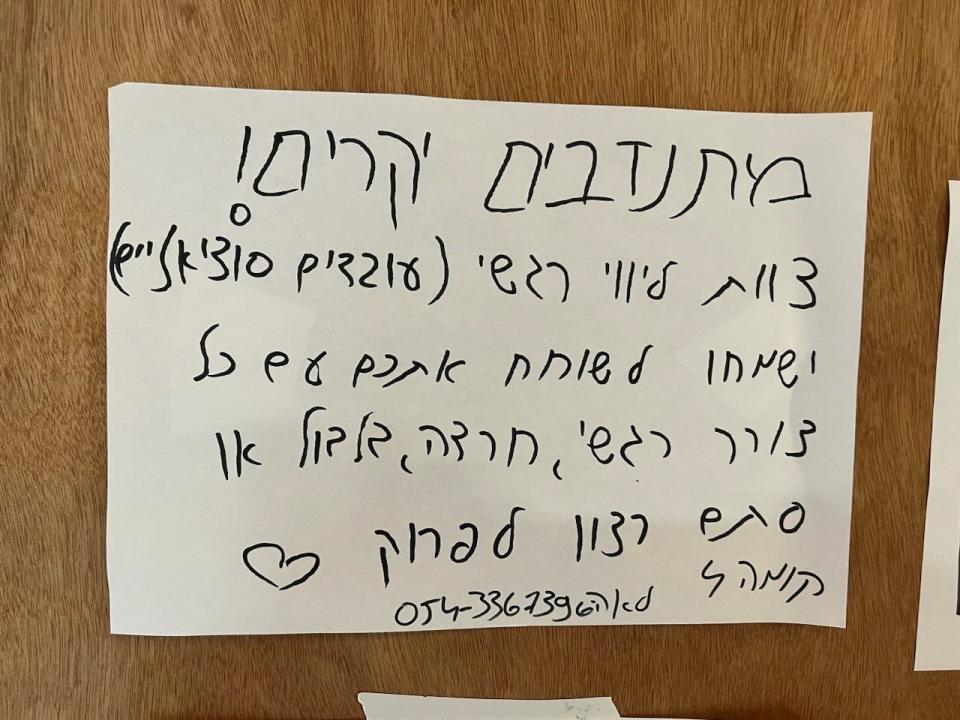On visit to Israel, Milwaukee Jewish leader sees resilience in the face of continuing trauma

Miryam Rosenzweig wants people to know that the fear and shock that gripped Israelis during the Oct. 7 Hamas attack didn't end that day.
It has only continued, said Rosenzweig, president and chief executive officer of the Milwaukee Jewish Federation. Israelis have grieved the deaths of friends and loved ones, watched as reservists are called up to fight in the military, and taken shelter as militant groups Hamas and Hezbollah launch rockets at Israel — many, but not all, of them intercepted by the Iron Dome missile defense system.
Rosenzweig, who this week took a two-and-a-half day trip to Israel with other North American leaders of local Jewish Federations, is returning to Milwaukee with a piece of a rocket that landed outside her sister's apartment near Tel Aviv after it was struck down by the Iron Dome.
"There is a level of hurt, fear, shock, pain and readiness because there's rockets all day long," she said. "But everybody makes sure to tell me that they're not as bad as other people, that others have it worse."
In meetings with survivors of Hamas' attack and with family members of hostages, Rosenzweig said she also has seen Israelis demonstrate remarkable resilience. They are beginning the work of healing now, she said.
"Today I heard the worst stories I've ever heard in my life. And I walked away so hopeful because it's a country that understands that they have to get through this, and they have to help each other," Rosenzweig told the Journal Sentinel on Tuesday from Israel.
Her visit comes amid concern among many world leaders that Israel was so outraged by the Oct. 7 attack and shaken by the breach of its security that its airstrikes and ground operation, intended to rid Gaza of Hamas, are killing too many civilians.
After the initial Hamas attack killed roughly 1,400 Israelis, with militants kidnapping some 240 more, Israel has bombarded Gaza, a narrow strip of territory with 2.3 million people. Food, water, medicine and fuel have been all but cut off, with only a trickle allowed in. The U.N. reports a dire humanitarian crisis is unfolding.
The Palestinian death toll has reached more than 8,700, roughly two-thirds of them women and children, the Gaza Health Ministry said. The figure is without precedent in decades of Israeli-Palestinian violence. More than 1.4 million people in Gaza have fled their homes.
Israeli officials have countered that Hamas members have enmeshed themselves among Palestinian civilians, making separation impossible.
And while some world leaders push Israel to let more aid into Gaza, Rosenzweig echoed the arguments of Israeli officials and their allies that Hamas is holding huge stockpiles of food, water, medicine and fuel in its underground tunnel network that it could distribute, if it truly cared about Palestinians.
The Israelis that Rosenzweig met largely believe the war with Hamas is necessary "for the survival of Israel and the Jewish people," she said.
"We have to root them out. We have to make sure that there can be two states that live next to each other, in harmony and peace for all of its citizens," she said.
More: Franklin man loses 32 relatives in Gaza airstrike. A beloved aunt and an infant are among the dead.
(For more information about the Hamas-run Health Ministry and how it calculates the death toll in Gaza, click here for a story from the Associated Press.)

Visit designed in part to see how donations are used
Rosenzweig traveled to Israel to see how the roughly $4 million in donations the Milwaukee Jewish community raised since Oct. 7 was being spent.
She glimpsed a massive effort to provide aid to displaced Israeli families, counseling to traumatized and grieving people, and activities for children who can't return to school yet, among other services.
Israel officials estimate about 250,000 Israelis have been displaced.
All over, she saw hand-written signs from social workers offering a listening ear if people needed to process their emotions aloud.
"I have watched just an incredible civil organization who've come together to say we're going to take care of each other and make sure that people are supplied," Rosenzweig said.
She also came to better understand "the enormity of the trauma here (in Israel) and psychological damage." She heard the story of a school bus driver who took his own life after he ferried to safety a group of children who survived Hamas' massacre of a kibbutz.
"This tragedy is going to take a long time to get over," she said.

Rosenzweig met with survivors of a kibbutz massacre near the border with Gaza who were taken in by another kibbutz in central Israel. They saw the value of being part of a tight-knit community during a difficult time, she said.
She also visited Magen David Adom, the Israeli emergency medical services organization, which operates a blood bank and a breast milk bank. She was struck that the agency is providing milk for 40 babies under 6 months old whose mothers were either killed by Hamas, taken hostage or are missing.
For her, it reinforced her view that Hamas — which the U.S. and European Union designate a terrorist organization — is not looking for peace. Its first charter refuses peace talks, she noted.
"This massacre, this devastation, it's not an act of resistance. It was not about occupation," she said. "It was not about anything but one mission that Hamas has had in its charter from the day it was created, and that is to wipe Israel off the map."
More: Palestinian-Americans in Milwaukee helpless as relatives in Gaza fear death is imminent
Palestinian-Americans in Milwaukee have said Hamas' attack didn't happen in a vacuum. They see Israel as an occupying force that has long mistreated and subjugated the Palestinian people. They also have called Israel's heavy bombardment of Gaza a war crime.
Rosenzweig said nothing can justify the atrocities of Hamas' attack.
"There's never an excuse for a terror attack. A terror attack is not to solve a political issue, it is not to further their cause," she said. "It's to create fear."
Everywhere she went, Israelis Rosenzweig met were grateful their stories were being heard, she said.
"They felt seen. They feel that the world has moved on and ignored what happened," she said.
One Israeli told her: "The unspeakable must be spoken about."
This article originally appeared on Milwaukee Journal Sentinel: Milwaukee Jewish leader sees trauma, resilience in wartime Israel trip

